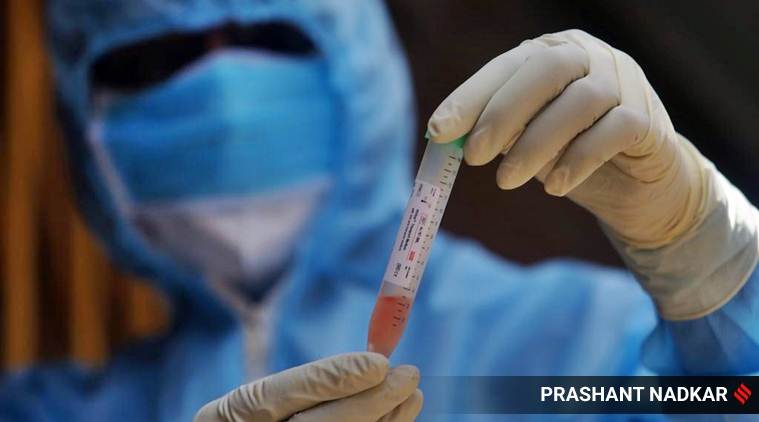As India enters the last week of the 40-day nationwide lockdown, a new research paper by the Indian Council of Medical Research (ICMR) has recommended a multipronged strategy to ramp up testing – moving from nine-hour shifts to working round the clock at government labs, redeploying testing machines from research institutes, and utilising point of care (PoC) testing equipment from the country’s TB and HIV testing network.
The idea, the paper says, is to ramp up public testing to 1,00,000 tests daily by the end of May. Augmenting testing capacity, it says, will reduce delays that lead to the formation of large clusters of the disease and an unchecked progression of severe cases, and put a heavy burden of critically ill patients on the health system.

The two pillars of the “potential plan” to scale up testing in the public sector are (i) moving to a 24-hour working model and (ii) leveraging the qRT-PCR and nucleic acid amplification test (NAAT)-based machines that are available with Multidisciplinary Research Units (MRUs), the National AIDS Control Organisation (NACO), and National Tuberculosis Elimination Programme (NTEP).
The short- and long-term strategy will, apart from augmenting testing capacity, expand access to testing to all 736 districts of the country from the current 114.
As part of the short-term strategy, the paper, ‘Strategic Planning to Augment the Testing Capacity for COVID-19 in India’, recommends, first, the optimisation of the existing capacity of the manual qRT-PCR machines.
The 216 machines in approved labs can be used in three shifts (24 hours) from the present two (16 hours), it says, thereby increasing their capacity from 28,008 to 40,464 tests per day. Also, the paper recommends the “redeployment” of the 42 manual qRT-PCR machines in the MRUs to other locations – this is projected to result in 6,048 tests per day in a 24-hour shift by May 3.
Second, the paper recommends the use of the “high-throughput automated platform” that is used by research labs to carry out thousands of chemical, genetic, or pharmacological tests every day. Such platforms are available at the National Institute of Biologicals (NIB), Noida, and the Regional Medical Research Centre (RMRC), Bhubaneswar, and their use can result in 1,493 tests per day in a 24-hour shift, the paper projects.
Story continues below this ad
Significantly, the paper recommends the use of the high-throughput automated platform available with NACO as well, in order to leverage the “spare capacity” available due to “reduced footfall” in the lockdown. “.These platforms have US Food and Drug Administration (FDA) Emergency Use Authorisation (EUA) for COVID-19 testing,” the paper says. “Currently, these are used for early infant diagnosis and HIV viral load monitoring. Two thirds of the functional machines have been co-located in the existing ICMR-approved laboratories.”
According to the paper, if 65 per cent of the qRT-PCR machines with NACO are in use by May 15, and the remaining functional machines by June 1, a total 11,404 tests can be conducted daily in a 24-hour shift.
The third recommendation is to utilise about 100 PoC NAAT-based automated platforms available with the NTEP, which can be used in 725 districts of the country. PoC testing is done close to the location of the patient care in order to reduce the therapeutic turnaround time.
Pointing out that the existing ICMR-approved public sector labs “cover only 114 of the 736 districts in the country”, the paper underlines the need for decentralisation in order “to increase coverage and ease sample transportation concerns”. As such, “about 100 of the operational PoC NAAT-based machines across the 725 districts in the country, used for TB diagnosis, are biosafety level 2 (BSL-2) approved and can be considered for capacity sharing”, it says.
Story continues below this ad
The paper projects that by May 31, 40 per cent of these 100 machines can be used for COVID-19 testing, which can produce 6,748 tests per day in a 24-hour shift.
The paper also recommends three medium-term interventions to increase testing: (i) procurement of more automated RNA extraction platforms, (ii) procurement of 10 additional high throughput automated platforms, and (iii) use of 150 NAAT machines with the NTEP.
“Currently, only about 25 per cent of the laboratories (29 laboratories) have automated RNA extraction capability, while the remaining conduct time-consuming and cumbersome manual extraction. Installation and/or operationalisation of automated RNA extraction platforms supported by requisite extraction kits at the remaining 75 per cent of the laboratories could increase testing capacity by 1.5-2 times within the same operating hours,” the paper, authored by Dr Nivedita Gupta and other members in ICMR COVID Team, says.
If both the short- and medium-term interventions are implemented, and if labs adopt the aggressive 24-hour working model, the testing capacity can be increased from 40,464 to 1,00,085 tests daily, the paper says. Under aggressive implementation, 28,273 daily tests can be done on platforms available with NACO and NTEP, while under a 16 working hours model (moderate), 18,849 tests can be done, says the paper.
Story continues below this ad
“In order to utilise the scaled-up testing capacity, increased workforce, adequate testing commodities and collection of enough samples/day would be critical… Furthermore, sample collection and transportation efforts will have to keep pace with the increased available testing capacity at the laboratories,” according to the paper.

 The paper projects that by May 31, 40 per cent of these 100 machines can be used for COVID-19 testing, which can produce 6,748 tests per day in a 24-hour shift. (Express photo by Prashant Nadkar)
The paper projects that by May 31, 40 per cent of these 100 machines can be used for COVID-19 testing, which can produce 6,748 tests per day in a 24-hour shift. (Express photo by Prashant Nadkar)






